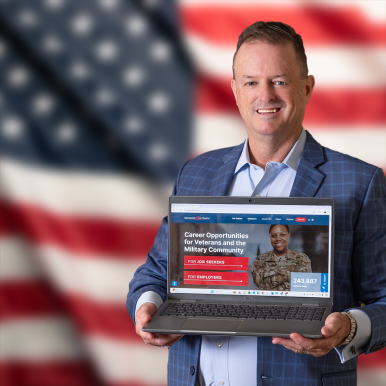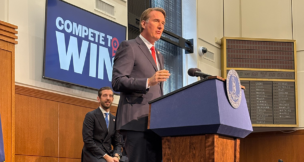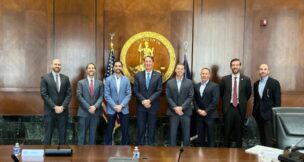
CFOS “need to be passionate about finance. It’s no longer just about number crunching,” says Anna Amirsoltani, controller with McLean-based wealth management firm Cassaday & Co. Photo by Shannon Ayres

CFOS “need to be passionate about finance. It’s no longer just about number crunching,” says Anna Amirsoltani, controller with McLean-based wealth management firm Cassaday & Co. Photo by Shannon Ayres
Beyond number crunching
Pro advice on how to become a CFO
Becoming a chief financial officer requires much more than just being a good accountant or number cruncher.
Indeed, the Journal of Accountancy in 2023 reported a noticeable shift of the top finance officer’s job from being a “CF-No” — or someone who just pulls tight the purse strings — to the “CF-Know.”
That’s a leader who has a “holistic grasp on the entire business and how it creates value and who uses that knowledge to provide insight,” Tom Hood, executive vice president of business growth and engagement at the Association of International Certified Professional Accountants, told the journal.
“Being a CFO and head of finance requires a particular mindset,” says Anna Amirsoltani, controller with McLean-based independent wealth management firm Cassaday & Co. “You need to be passionate about finance. It’s no longer just about number crunching.”
Understanding the value of operational know-how, as well as having a keen attention to human resources and company culture, are all priorities for the modern-day CFO. Considering the changing roles and expectations of CFOs begs the question of what truly prepares professionals to step into these C-suite positions of power — and what they’ve had to learn along the way. Virginia Business spoke with CFOs from across the commonwealth to understand what it takes to become a successful finance executive in today’s business world.
A multifaceted job
Dale Young didn’t always know he wanted to be a CFO. In fact, he wasn’t even sure he wanted to be an accountant. He spent most of his childhood in Chicago dreaming of becoming a professional tennis player some day — a passion he pursued into his young adult years. He ended up playing tennis through college on a scholarship, but when it came time to play professionally, Young realized he “wasn’t quite good enough.”
He ended up in accounting mostly because he felt inspired by his uncle, who was a CPA. So, Young started studying accounting while at Tulane University. And “once I decided on that, I had no other interest in really doing anything [else],” Young says. “My career progression is really based more on personal circumstance than anything.”
The family connection driving his career didn’t stop with his uncle. Young, who is a dual Canadian and U.S. citizen, also has Irish citizenship from his marriage. “Because of those citizenships, I was able to work in different parts of the world without having a work visa,” Young says. “That had a profound impact on me because, to date, I’ve spent around 11 or 12 years living and working outside of the U.S.”
He’s had a variety of work experiences, with finance and accounting-related roles at Marriott, Diamond Resorts and a private equity firm. Now Young serves as chief financial and administration officer for RecruitMilitary, a Chesapeake military-to-civilian recruiting company where he’s worked for nearly five years.
Amirsoltani also earned her stripes working in a variety of industries, including the corporate office of a restaurant and hotel business and for the Smithsonian Institution.
“These experiences — combined with my education — have provided me with extensive knowledge and expertise and solidified my decision to build a career in finance,” she says.
Jackson G. Green, chief financial and compliance officer with Roanoke-based Goodwill Industries of the Valleys, suggests seeking “broad experience in your education, interests, roles, organizations served and professional relationships.”
Like Young and Amirsoltani, Green has led a diverse career. He’s held jobs with an architecture and engineering firm, a venture capital-funded tech company and a research company as it issued its IPO. Plus, Green got his start in public accounting, “which gave me broad exposure to many industries and companies — public, private, nonprofit, governmental, closely held and such,” he says.

While Young’s background in accounting and finance roles culminated in landing his role as RecruitMilitary’s CFO, his job goes beyond traditional number crunching. Young sees his role as being multifaceted: understanding operations and sales; communicating the business’ story to internal and external stakeholders; developing strategies to improve the business; and focusing on human resources.
“Those four things transcend very differently from what I would call controller work or the daily accounting function that people may think of traditionally,” Young says. “The No. 1 thing you need to understand is where people are and how they’re doing, and what they need to get the job done, and what they need to make them happy.”
Green also approaches his role from a variable perspective. He spends at least 25% of his day on strategic planning and forecasting; another 25% on building, supporting and guiding his teams; another quarter on current projects and analyses; and the remaining balance on “nurturing and maintaining critical relationships with stakeholders,” as well as dealing with any unplanned operational situations or challenges that arise.
Preparing to become a CFO
Beyond professional experience, top accounting and finance executives agree that education was foundational to their interest in and dedication to their profession.
For instance, Amirsoltani says she always had a passion for finance, recalling her strong interest in board games Monopoly and Power Grid, “which made choosing business school an easy decision.” She earned her bachelor’s degree in accounting and financial analysis from the State University of Trade and Economics in Kyiv, Ukraine, and then received her CPA certification. This year, she enrolled in an executive program at Columbia Business School “aimed at enriching the knowledge of CFOs.”
For those aspiring to one day become CFOs, Amirsoltani says, “one of the most important factors, I believe, is natural curiosity and willingness to learn,” which can include pursuing a CPA, CMA or MBA. “Staying up to date with industry trends, best practices, technology and networking has been very beneficial for me.” She enjoys learning about cybersecurity and artificial intelligence, both of which stand to have a profound impact on accounting and finance — and the entire business world.
Increasingly, human resources has also become a critical part of the CFO’s role — and that’s something not all financial professionals are adequately prepared for by their schooling. Rather, it’s something they must acclimate to on the job and express interest in.
“I’ve always been fairly outgoing and fairly communicative with people, both on a personal and professional level,” Young says. “But understanding the people impacts on an organization all the way down from senior leadership to the [person] starting out in the lowest level jobs” is as important a part of his job as financial forecasting. That means Young makes decisions not only from a “balance sheet point of view,” he says, but also from an individual employee satisfaction perspective.
Amirsoltani also stresses the importance of having a mentor throughout one’s career, especially someone outside your firm, to continue to offer challenges and provide guidance.
Having a mentor “is especially advantageous, as it provides a unique opportunity to gain unbiased perspectives and feedback,” she says. Attending professional conferences, webinars and finance events are also “essential,” Amirsoltani says.
“Networking helps me stay informed about industry trends and developments,” she says.
A pathway to CEO

While being a chief operations officer, executive vice president or president of a company can provide a predictable path to becoming a CEO, it’s actually becoming far more common for CFOs to transcend to the top leadership position due to their expanded responsibilities.
“It’s a very exciting role but can come with lots of high pressure,” says Amirsoltani, who also serves as a key strategic adviser to the CEO and the board, providing financial insights that ultimately drive business decisions.
“As a CFO, you’re the right-hand person to the CEO,” she says. “You need to thoroughly understand your business, treat the company as if it’s your own and ultimately think like an owner.”
Thinking like the CEO lends itself well to ultimately landing that top position. About 40% of all global CEOs stepped into their role directly from being a CFO, COO or head of division, according to executive search firm Heidrick & Struggles.
Getting even more granular, 33% of S&P 500 CFOs who changed jobs in 2022 became CEOs, a massive jump from 8.8% in 2021, according to research by executive search firm Russell Reynolds Associates. Perhaps the most well-known example of this type of transition was Indra Nooyi, who served as chairman and CEO of PepsiCo from 2006 to 2019 after serving as the Fortune Global 500 company’s president and CFO.
Former CFOs make for strong CEO candidates because they’re forced to understand nearly all aspects of a business.
Being a CFO “is not the easiest role and, I would argue, probably the most difficult role to ascend to,” Young says. “If you look at Fortune 500 companies, or even Fortune 1000, or up and down the line — even into private businesses — you see a large proportion of people who start off in a CFO role that ended up … a CEO.”
That’s because being a CFO teaches a professional to not only know their own job, but everyone else’s, Young adds.
Being a CFO also requires flexibility and continued learning.
“Like many who pursue accounting careers, I tend to be risk-averse in my nature,” Green says. “I’ve had to learn through the years to better balance risk and return and to be comfortable with making decisions with only 80% of the desired information.”















